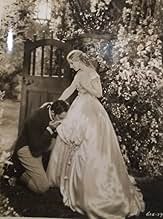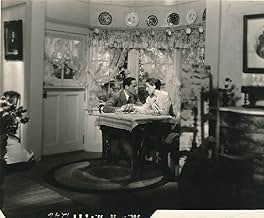Füge eine Handlung in deiner Sprache hinzuThe adoptive father of a young woman is horrified to learn she plans to marry the son of the man who accidentally killed her aunt years before.The adoptive father of a young woman is horrified to learn she plans to marry the son of the man who accidentally killed her aunt years before.The adoptive father of a young woman is horrified to learn she plans to marry the son of the man who accidentally killed her aunt years before.
- Für 1 Oscar nominiert
- 6 Gewinne & 1 Nominierung insgesamt
- Minister
- (Nicht genannt)
- Young Party Guest
- (Nicht genannt)
- Young Party Guest
- (Nicht genannt)
- Young Kathleen
- (Nicht genannt)
- Richard Clare
- (Nicht genannt)
- Gardener
- (Nicht genannt)
Empfohlene Bewertungen
Sidney Franklin's film is the quintessential tearjerker, one that I have dreamed of watching all my adult life, and tonight I finally managed. Not many films outlast those sorts of expectations, I found recently that 'Sevent Heaven' was relatively feeble-minded, not the film I had been looking forward to.
'Smilin' Through' triumphs though, soaringly so. The film is not only sumptuous in decor and cinematography, but has a real heart and real intelligence. I loved the way that almost every scene takes place in a garden with burgeoning flora, drooping flowers, heavy with romantic regret and sexual portent. One could almost smell the dizzy perfume of the plants. And I admired the way that Sidney Franklin distinguishes so clearly and yet not demonstratively between the way that young love professes itself in the 1860's, the time of John's and Moonyeen's courtship, and the war years with Kathleen's and Ken's romance. Franklin, in his direction, subtly underlines the tender dewy-eyed romanticism of the old days, "misty, water-colored mem'ries" indeed, with Kathleen perpetually wearing her wedding gown, even in her scenes as a ghost. And in the modern story we have an altogether more practical couple, acting in the context of a world war, with the far-away guns and canons sending rumblings through the village, sending windows and panes rattling. Kathleen in the modern story is more earthy and doesn't, in this pre-Code Hollywood picture, disguise how she is longing for her sexual union with Ken: "By the time I'm through with you, you won't be able to fight anyway", she claims.
The acting is a chapter unto itself. I was never a fan of Leslie Howard's, and although it must be said that his part is probably the least interesting in the film, he conveys an endearing boyishness in the 1860's scenes, easy-going and infectious. Fredric March strikes up a marvelous rapport with Norma Shearer, sending off sparks of a loose energy that seem almost improvised, certainly captivating. Their scenes today should even today serve as must-see footage for acting students. March shows glimpses of the impressive character actor he was to become, and Shearer is luminous and entirely lovable, great performances.
The perfect genre piece, destined to give you the most delicious heartache.
MGM's box office star, named "Quigley Publications" #6 for 1932, acts giddy and girlish in soft focus. Director Sidney Franklin, who helmed both this and the earlier silent film version, does excellent work with windows.
"Smilin' Through" was originally a tremendous hit for popular stage actress Jane Cowl, who wrote the strongly romantic story with Jane Murfin (using the alias "Allan Langdon Martin"). Ms. Cowl starred in only a couple of silent films, unfortunately. Even worse, the 1922 "Smilin' Through" with Norma Talmadge in the leading roles is not available for viewing. There are prints of this film surviving in the U.S. Library of Congress and the Netherlands Film Museum. It was one of Ms. Talmadge's most successful, winning a "Quigley Publications" honor as 1922's best picture, and should be restored. The Shearer version won the 1932 "Photoplay" award. MGM did it again with less success, in a 1941 musical starring Jeanette MacDonald.
Note this version's unaccredited gardener David Torrence played Howard's pal "Owen" in the 1919 stage version; and, the 1941 version's unaccredited doctor Wyndham Standing played Howard's role in the 1922 silent version.
****** Smilin' Through (9/24/32) Sidney Franklin ~ Norma Shearer, Fredric March, Leslie Howard, O.P. Heggie
I loved the way the story was told, with a flashback, so that it was a bit like a movie within a movie. It also felt like love playing out across generations, and recurring, with all the same depth of feeling. Some of the scenes evoke a sentimental or poignant feeling – in the cemetery, remembering love lost – and others evoke that wonderful feeling of falling in love. The mansion scene, with that delicious ambiance of cobwebs, a fire, an old portrait, and with Shearer and March toasting one another after he finds an old bottle of port, is fantastic. "Any old port in a storm," he quips. The two have such chemistry together. Their bike ride and time in the teahouse is also sweet, after he had essentially admitted to stalking her ("you're a window-peeper", she teases). Towards the end of that scene Shearer says, almost breathlessly, "Love is ... something you feel. It just happens. You can't do anything about it. If I loved somebody, I'd love him forever", as the camera dissolves on the old woman who has fallen asleep.
I'm usually not big on Leslie Howard, but he was great too, and his scenes with the other character Shearer played were wonderful. He says to her "Wouldn't it be marvelous if every time I opened my eyes for the rest of my life, you were there?" She says: "I will be." And he says: "And always as beautiful as you are tonight?", the last bit echoing March's toast in the mansion. It's all the more touching seeing these kinds of scenes in an old movie where the actors have all passed away, but are captured in these moments, so ephemeral and fleeting, and yet with feeling so strong and dramatic.
Shearer's character's personality is a romantic, and the plot allows her to express her love with such urgency, because March is going away. It is reserved and proper, with almost all of the characters (except March's father / evil March and his drinking problem) having a sense of decorum and grace, and yet these two are allowed to express their love so freely and fiercely ... it's a great combination. As she says when he's going away, "It's no use, I'll always love him. I'm just that sort of a fool. I have no pride", any hopeless romantic can identify.
March's dual role may remind you a bit of his role in Dr. Jekyll and Mr. Hyde (though this is of course two characters), and as the film plays out, you may also be reminded of "An Affair to Remember". There is real angst here, from those whose love is unrequited for reasons that simply can't be explained – love happens or it doesn't – to those who suffer tragedy. When Shearer and March must part, she says with real passion, "I'm yours and you're mine; I want that to be true before you go" implying marriage and sex, but he demurs, torn.
And yet, how magical it is; the eyes, the smiles, the banter, the embraces. This would be a great movie to curl up in front of with someone you love.
The first song I remember my mother singing to me was "Smiling Through" ("But through all the long years, when the clouds brought their tears, those two eyes of blue came smiling through at me"), and she'd tell me the movie's story. I taught the song to my children and grandchildren, but until recent years there was no way to get a copy of the movie.
I thought I wanted the Jeannette MacDonald version because of her beautiful voice, but it was back ordered and only this one was available--lucky for me. It seems to be everyone's favorite of the three.
The wedding scene is a masterpiece--understated and heartbreaking, but I'm finally able to handle it. It's that very last scene that gets me every time. Best kind of tears, though: the kind you're "smiling through".
Norma Shearer, like Irene Dunne, is not only beautiful to look at but irresistibly likable.
Wusstest du schon
- WissenswertesFredric March commented to his first cousin, Kathryn Davis, about working with Norma Shearer, that, yes, she was a great actress and very professional, but she could be difficult because she constantly expected perfection. When Davis asked what that specifically meant, March replied, "She was never satisfied, kept having us do take after take." Pausing, he continued, unabashed, "Especially our love scenes. She always wanted to redo all the love scenes, several times!" Davis wanted to ask why he supposed Shearer always wanted to retake the love scenes in particular, but thought better of it and kept silent.
- PatzerThe bulk of the story takes place during the WWI era, 1915-1919, but all of Norma Shearer's clothes, hats, and hairstyles are in the 1932 mode, the year the film was made, a typical practice of the era.
- Zitate
Kenneth Wayne: How about a toast?
Kathleen: I know one. Here's to your health, your honor, and the health of all your descendants, great and small.
Kenneth Wayne: That's a mighty handsome toast.
Kathleen: But, Irish toasts are the best I know.
Kenneth Wayne: May you keep as young and as pretty as you are, until doomsday, and never forget the man who wished it.
Kathleen: I wonder now, as I look at you, have we never met before?
Kenneth Wayne: No, I guess we haven't. I shouldn't have forgotten.
Kathleen: Oh, could you be Irish too!
Kenneth Wayne: Yeah, I could, if I saw enough of you!
Kathleen: Oh!
- Crazy CreditsAs MGM would later do with Das zauberhafte Land (1939), no mention at all is made of any of the actors having dual roles. Thus, the characters "Moonyeen" and "Jeremy Wayne" are not mentioned in the credits, although the characters are drastically important to the story.
- VerbindungenFeatured in Happy-End für eine Ehe (1969)
- SoundtracksSmilin' Through
(uncredited)
Written by Arthur A. Penn
Played on piano and sung by Norma Shearer (dubbed by Georgia Stark)
Music integrated into the score throughout
Top-Auswahl
- How long is Smilin' Through?Powered by Alexa
Details
- Erscheinungsdatum
- Herkunftsland
- Sprachen
- Auch bekannt als
- Smilin' Through
- Drehorte
- Produktionsfirma
- Weitere beteiligte Unternehmen bei IMDbPro anzeigen
Box Office
- Budget
- 851.000 $ (geschätzt)
- Laufzeit
- 1 Std. 38 Min.(98 min)
- Farbe
- Seitenverhältnis
- 1.37 : 1






































